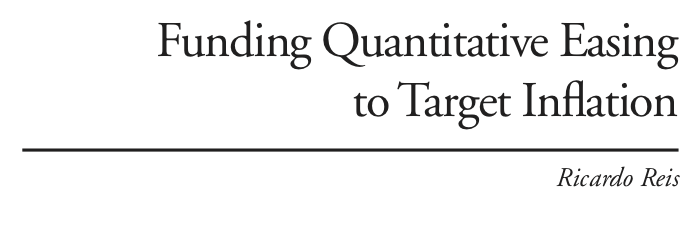
I’ve just been catching up with Jackson Hole’s symposium. It had some great papers. But, of course, the attention went to Jay Powell’s speech. Most people liked it. But, reading it today, the speech has made me nervous about US inflation. Here is why. 🧵
ft.com/content/ced452…
ft.com/content/ced452…
I mostly agree with Powell that (1) much of the recent increase in inflation is relative prices not pure inflation, (2) these price changes seem temporary, (3) no pick up in wages so far, (5) global forces are favorable. But not with his discussion of (4) inflation expectations.
Powell started with “as long as longer-term inflation expectations remain anchored” we'll be fine. But I expected that to be followed by: “here is what I will do to anchor them”. Expectations depend on *his* policy choices. They're not some exogenous force
federalreserve.gov/newsevents/spe…
federalreserve.gov/newsevents/spe…
I didn't expect Powell to follow with just “Fed will keep inflation close to our 2% objective”. I wanted to hear him loudly affirm his commitment to it. That he'll do whatever it takes to keep the inflation anchor. In short, that we can trust and not change our expected inflation
Instead Powell reported that an index-the CIE-is steady. I’ve done some research on dynamic factor models applied to inflation. Recently, I’ve thought hard about how to combine expectations data from markets and surveys. The CIE is, imho, a flawed measure
ideas.repec.org/p/cpr/ceprdp/1…
ideas.repec.org/p/cpr/ceprdp/1…
(Why? Briefly, the CIE throws together some data series that are different in what they measure, ignores how they relate to each other, leaves out some crucial pieces of data, and calculates correlations that are likely unstable over the last 25 years.)
bit.ly/3DsPCJa
bit.ly/3DsPCJa
In household surveys, there is a very large increase in both expected inflation as well as disagreement over the last 12 months. In markets, options prices show a very large increase in the prob. of an inflation disaster. Is the anchor lost? No. But the anchor has drifted a bit.
Later Powell stated that the 1970s saw runaway inflation because after the oil shocks "the public had come to generally expect higher inflation". I disagree, this is not what the data shows. (On Thursday 9/9 I will present new research on the topic.)
brookings.edu/project/brooki…
brookings.edu/project/brooki…
Finally he concludes by saying that “we now monitor inflation expectations so carefully”. I hope so, I thought so, and I continue to believe so. But the speech dented my confidence a little bit.
ideas.repec.org/h/bis/bisbpc/1…
ideas.repec.org/h/bis/bisbpc/1…
Imho, the FOMC has been moving in the right direction in the last few months. My median expectation is still that US inflation is under control. But Jackson Hole's speech did no assuage my mild inflation fears. Instead it intensified them.
• • •
Missing some Tweet in this thread? You can try to
force a refresh





